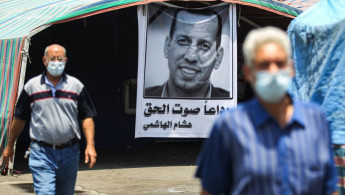Iraq: Killer of researcher Hisham al-Hashimi has conviction annulled, raising concerns over militia influence
The convicted perpetrator behind the killing of Iraqi academic Hisham al-Hashimi has had his death sentence annulled and is under a new investigation in an apparent attempt to lower his sentence, Iraqi sources said.
Al-Hashimi, a security expert on both Sunni and Shia jihadist groups including the Islamic State group (IS) and Iran-backed groups in Iraq, Lebanon, and Yemen, had been a well-known expert, appearing in local and international media outlets. He was shot dead by gunmen outside his home in eastern Baghdad on 6 July 2020.
A former officer in the Iraqi interior ministry, Ahmed al-Kinani, 38, confessed on Iraqi state media television in June 2021 that he had killed Al-Hashimi.
Kinani was sentenced to death by the Rasafa Criminal Court in May 2023 after being convicted of the crime.
However, Iraq's Federal Cassation Court decided to annul the sentence and refer the case back to "a competent investigating court", according to an official statement.
"Al-Kinani is still in custody in a prison in Baghdad and was presented the investigating judges for further investigations into the case. Other questions have been added to the investigations to reveal more details about the crime," Iraqi judicial sources on Monday told The New Arab’s Arabic-language sister site Al-Araby Al-Jadeed,
"New lawyers have been assigned to the convicted person after he denied his previous confessions."
Hashimi's killing sparked an outcry from international journalists, researchers, and academics, as well as many in Iraq who saw his killing as another manifestation of how powerful pro-Iran militias - widely suspected to be behind the killing - had become.
Armed factions, notably Kataib Hezbollah - to which al-Kinani is reportedly connected, had pushed for his death sentence to be annulled and his execution was postponed ten times.
Iraq's judicial authorities face widespread public anger over the al-Hashimi case, as well as the killings of dozens of Iraqi activists, due to the lack of resolution on their cases and incomplete investigations into the murders, whicht took place between 2019 and 2021.
Armed militias, including Kataib Hezbollah and Asa'ib Ahl al-Haq, are accused of being behind the targeted killings of civil activists in Iraq in recent times.
"The killings of Hisham al-Hashimi, journalists, activists, and media figures over the past years are orchestrated by entities, not individuals,” Iraqi activist Tahseen al-Zubaidi, Al-Araby Al-Jadeed.
"Therefore, investigating a convicted person as the culprit of the murder story is a dilution of the case and manipulation of the truth."
Al-Zubaidi said: "Iraqi officials and those close to them exchange a lot of information in their private councils, perhaps more important than investigating Al-Kinani. This information includes religious fatwas that call for killing by some unknown clerics, in addition to coordination with regular security authorities."
He added: "When al-Kinani appeared on television and confessed to his crime, it became clear that he was an officer and unrepentant for his actions, confirming the information spoken about by officials. This file is very serious and should be considered a national security crime, not a regular crime."
Hisham al-Hashimi was born in Baghdad in 1973, belonging to the Rikabi Arab tribe which lives in the southern part of the country. He worked as an academic and specialised researcher in security and political affairs in Iraq.
He was assassinated on July 6, 2020, in front of his house in the Zayouna district of Baghdad by masked individuals on motorcycles while returning from a television interview where he criticised the activities of armed groups responsible for launching rockets and attacking diplomatic missions in the Green Zone of Baghdad, describing them as "non-state forces".
Pro-Iran militias which are part of the Popular Mobilisation Forces (PMF, or Hashd al-Shaabi) coalition have received official sanction from the Iraqi government.





 Follow the Middle East's top stories in English at The New Arab on Google News
Follow the Middle East's top stories in English at The New Arab on Google News


